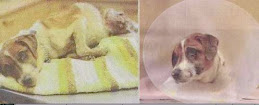Animals Are Not Ours to Wear
 Skins: Abuse of Animals
Skins: Abuse of Animals On fur farms, inquisitive and normally free-roaming animals such as foxes, minks and chinchillas spend their entire lives confined to tiny, filthy wire cages. They are denied the opportunity to engage in natural behaviours such as climbing, burrowing and swimming, and many go insane. When they are killed, animals are often gassed, anally or genitally electrocuted, or poisoned with strychnine, or their necks are snapped. These methods are not always effective: some animals wake up while the skin is being torn off their bodies.
Leather is just as cruel as fur. Every year, more than 1 billion animals are slaughtered in the global leather industry, which pulls in £600 million per year in Great Britain alone. In the UK, these animals are most commonly cows. Leather from Asian countries such as India and China often comes from animals whose throats were cut and whose skin was ripped off while they were still conscious.
But it's not just cows who suffer for the leather and fashion industries. The exotic-skins industry claims the lives of millions of snakes, alligators, seals, zebras and other beautiful animals, whose skins are regularly found on catwalks and celebrities' bodies. Other skins come from more familiar faces. An estimated 2 million cats and dogs are killed in China every year, and hundreds of thousands of cats' and dogs' skins are traded in Europe.
Thirty per cent of the world's wool comes from Australia, where sheep farmers mutilate millions of lambs in a cruel procedure known as mulesing. This mutilation is a misguided attempt to prevent flystrike, even though humane alternatives exist.
Many celebrities and important figures have joined PETA in the campaign against the cruel use of animal skin and fur.
This was taken from the peta web site - http://www.peta.org.uk/issues/animals-are-not-ours-to-wear/
Make a difference - Make the pledge to go fur free.




No comments:
Post a Comment